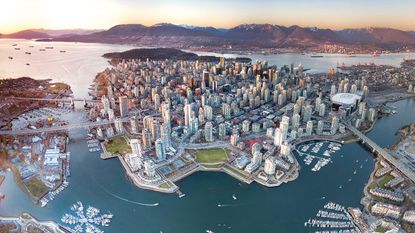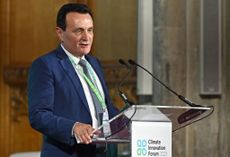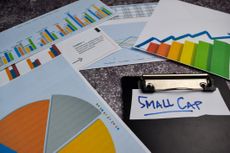The global property bubble
Forget equities, the real post-pandemic action has been in property. And not just in the UK – it is a worldwide phenomenon.

Forget equities, says Mike Bird in The Wall Street Journal. The real post-pandemic action has been in property. This “larger and slower-moving market” is still the place where most wealth is to be found. Even in America, a land of compulsive stockmarket investors, real-estate wealth amounts to $44,349 per adult, compared with $34,008 in stocks and bonds, according to Credit Suisse.
Property prices plunged globally after the 2007 financial crisis, but this time round banks are in “much ruder health” and more willing to lend. Prices are up in almost every wealthy country over the past year. In New Zealand they surged by 21.5% in the year to February.
It’s been a year since the housing market closed as the pandemic took hold, says Melissa Lawford in The Daily Telegraph. For a short period you could snap up multimillion-pound central London property at a 25% discount as sellers panicked. Yet by the summer the stamp-duty holiday was driving a new boom that has continued ever since. “Sales outpaced supply at the fastest rate in 14 years” in February, says the Royal Institution of Chartered Surveyors.
Subscribe to MoneyWeek
Subscribe to MoneyWeek today and get your first six magazine issues absolutely FREE

Sign up to Money Morning
Don't miss the latest investment and personal finances news, market analysis, plus money-saving tips with our free twice-daily newsletter
Don't miss the latest investment and personal finances news, market analysis, plus money-saving tips with our free twice-daily newsletter
The “great reshuffling”
Global superstar cities such as London and New York were the big property winners of the past decade, says The Economist. No longer. Prices in Manhattan fell by 4% last year. In what US property website Zillow dubs the “great reshuffling”, prices are now rising fastest in suburbs within commuting distances of big cities but offering more space. If remote-working endures post-Covid-19, then that trend will not fully reverse. The pick-up has been broad-based: US house prices are up 11% over the last year; German prices rose by 9%. Across 25 rich countries “only in Japan” have prices retreated over the past 12 months.
Australia, the country where the property bubble never quite seems to pop, has been enjoying yet another boom, says Matthew Burgess on Bloomberg. A cocktail of low interest rates and housing undersupply saw prices advance by 2.8% in March, the biggest monthly gain since 1988. Prices are up by 6.2% on the year. Goldman Sachs thinks Australian property could rise by another 15% over the next two years as people seek more space to set up home offices.
Perhaps nowhere has the boom been more frenetic than in Canada, says Ian Austen in The New York Times. Exceptionally generous pandemic stimulus saw the country run a deficit of about 19% of GDP last year. Now house hunters have cash to splash. In Vancouver the price of a detached home surged by 13.7% in the year to February. In Toronto the equivalent index soared by 23.1% over the same period. Analysts wonder if this bubble is about to burst, and no wonder: a “rundown, one-car garage” in the city recently sold for C$729,000 (£419,000).
-
 Private school fees soar and VAT threat looms – what does it mean for you?
Private school fees soar and VAT threat looms – what does it mean for you?Rising private school fees could see more than one in five parents pull their children out of their current school. Before you remortgage, move house or look to grandparents for help, here’s what you need to know.
By Katie Williams Published
-
 Best and worst UK banks for online banking revealed
Best and worst UK banks for online banking revealedWhen it comes to keeping your money safe, not all banks are equal. We reveal the best and worst banks for online banking when it comes to protecting your money from scams
By Oojal Dhanjal Published
-
 AstraZeneca CEO’s £1.8mn pay rise approved despite shareholder opposition
AstraZeneca CEO’s £1.8mn pay rise approved despite shareholder oppositionAstraZeneca hiked its dividend to persuade shareholders to accept CEO Pascal Soriot’s pay rise. Is he worth his salary?
By Dr Matthew Partridge Published
-
 Adidas, Nike or Jordans - could collectable trainers make you rich?
Adidas, Nike or Jordans - could collectable trainers make you rich?The right pair of trainers can fetch six figures. Here's how you can start collecting vintage Adidas, Nike or Jordans now
By Chris Carter Published
-
 The industry at the heart of global technology
The industry at the heart of global technologyThe semiconductor industry powers key trends such as artificial intelligence, says Rupert Hargreaves
By Rupert Hargreaves Published
-
 Three emerging Asian markets to invest in
Three emerging Asian markets to invest inProfessional investor Chetan Sehgal of Templeton Emerging Markets Investment Trust tells us where he’d put his money
By Chetan Sehgal Published
-
 What to consider before investing in small-cap indexes
What to consider before investing in small-cap indexesSmall-cap index trackers show why your choice of benchmark can make a large difference to long-term returns
By Cris Sholto Heaton Published
-
 Why space investments are the way to go for investors
Why space investments are the way to go for investorsSpace investments will change our world beyond recognition, UK investors should take note
By Merryn Somerset Webb Published
-
 Time to tap into Africa’s mobile money boom
Time to tap into Africa’s mobile money boomFavourable demographics have put Africa on the path to growth when it comes to mobile money and digital banking
By Rupert Hargreaves Published
-
 M&S is back in fashion: but how long can this success last?
M&S is back in fashion: but how long can this success last?M&S has exceeded expectations in the past few years, but can it keep up the momentum?
By Rupert Hargreaves Published